Emergency Dentistry – San Antonio, TX
We’re Here to Help Stop Your Dental Pain

When you have a true dental emergency – such as an extremely painful toothache or a tooth that has been knocked entirely out of your mouth – you need attention from an expert immediately. Putting it off will only make the situation worse. Call our dental office immediately to set up an appointment with Dr. Patel; our team will immediately take steps to help you manage your pain and repair any damage that has been done to your smile with emergency dentistry in San Antonio, TX.
Why Choose HIC Dental - Implant & Family Dentistry for Emergency Dentistry?
- Same-Day, After-Hours, and Weekend Appointments
- Always Transparent About Your Needs
- Nitrous Oxide and Oral Conscious Sedation
How We Treat Dental Emergencies

- Set up a same-day appointment: We can arrange to see you right away if you’re currently dealing with a dental emergency. We offer after-hour and weekend emergency appointments so that you can get the help you need no matter when your emergency strikes.
- Comprehensive emergency exam: When you arrive at our dental office, we’ll get to work examining your mouth to figure out the source and extent of the emergency at hand.
- Review findings: After we’ve narrowed down what the problem is, we can consider what treatments are available and discuss our recommendations with you directly. We’ll explain how much a given treatment will cost and how long you can expect it to take so that you can make decisions that are right for you and your smile.
- Get the care you need: This step is different for everyone. Some people only need fillings or a similarly simple restorative procedure, whereas others might need root canal therapy to get them out of their pain. Whatever the case, we’ll make it our priority to treat the problem as quickly as possible so that you can get your oral health back to normal.
The Most Common Dental Emergencies
There are two broad kinds of dental emergencies: those caused by poor oral hygiene and those caused by accidents or trauma. Whatever led to your emergency, you’ll need to get professional help quickly if you want to keep your smile safe for the long term. Below are some particularly common emergencies that you might have to deal with at some point in your life.
Understanding the Cost of Emergency Dentistry

You need to have emergency dental treatment performed as soon as possible, but you should also confirm that you’ll be able to pay for it. When we’re discussing the services that are recommended for your specific dental issues, we’ll answer any questions you might have about the costs you can expect. We’ll make sure that you understand the financial aspect of your care upfront so that you aren’t caught off guard when it’s time to pay later.
Every Dental Emergency is Different
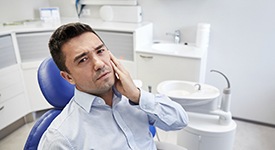
One patient might need a filling as part of their emergency treatment. Others might require root canal therapy. In certain situations, it might even be necessary to have the tooth removed so that it can be replaced. In short, there are many different kinds of emergency treatments that we may recommend; as such, you won’t know for sure how much you can expect to pay until an expert has looked at your mouth.
Does Dental Insurance Cover Dental Emergencies?
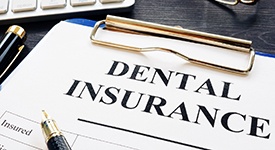
When you have an urgent oral health situation, what can you expect from your dental insurance company? Most plans will pay for an emergency exam, and they typically cover a percentage of the cost of a variety of restorative procedures. Many of the treatments that are often part of emergency dental care receive 50% to 80% coverage on average.
Are you not sure how your own dental insurance plan works when it comes to emergency care? Our team can help you navigate your policy so that you’re fully aware of your benefits and how they can be used.
Other Options for Making Dental Emergencies Affordable

You never want to feel doubtful about being able to pay for dentistry, and that’s especially true when you need emergency care. We work with CareCredit to bring our patients flexible financing for important treatments. Even without insurance, you’ll find it easier to pay for your care with a CareCredit plan that breaks up the cost. One advantage of CareCredit financing is that there are several plans to choose from, and many of them have low interest rates or even no interest at all.
Taking Care of Your Smile Can Save You Money

While dental emergencies are unfortunately nowhere near as uncommon as most people would like to believe, many of them are in fact avoidable. If you maintain good oral hygiene practices and visit your dentist for routine care, you can lower your risk for various oral health issues – and therefore may not have to pay to have them treated in the future.
But what if you’re already noticing signs that indicate something is wrong in your mouth? In that case, you should call our office immediately for an emergency appointment. It’s usually less expensive to have dental issues treated while they’re in their relatively early stages; more advanced problems tend to be more complicated to address and thus carry a higher cost.
Keys to Preventing Dental Emergencies

Unfortunately, it’s not always possible to avoid the accidents that can lead to dental emergencies. There are, however, plenty of steps that you can take to keep your smile as safe as possible. Keep reading to learn a few we recommend to our San Antonio patients!
Visit Your Dentist Regularly
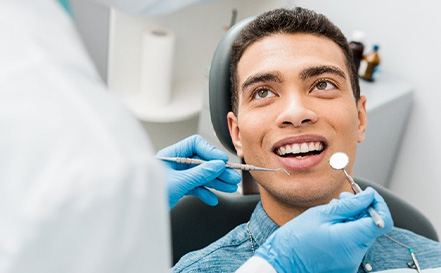
To keep your teeth and gums healthy, you need to make time for at least two dental visits every year. This ensures that serious oral health concerns are caught in the initial stages and that others are prevented with periodic, thorough cleanings. Of course, if you’re experiencing any abnormal symptoms between visits, like a persistent toothache or inflamed gums, then we recommend coming in much sooner. That way, we can treat the root of the problem before it necessitates emergency dentistry.
Maintain Good Oral Hygiene At Home

Your at-home oral hygiene routine is crucial, so make sure you’re brushing and flossing every day. Remember, the products you use and timing matter. In addition to using a soft-bristled toothbrush and toothpaste with fluoride, you should be brushing for a full two minutes each morning and evening. It’s also worth noting that taking care of your smile at home extends to being gentle with your teeth and avoiding habits that could damage them. That includes not biting your nails, chewing on ice, or engaging in any other unhealthy dental habits.
Stick to a Nutritious Diet

In short, what you eat matters. Foods that are starchy or high in sugar can lead to tooth decay, which can be painful and leave your teeth vulnerable to cracks and chips. Similarly, tortilla chips, peanut brittle, raw nuts, and other crunchy foods can cause damage. That’s why we recommend filling your plate with nutrient-dense, smile-friendly foods as often as possible, including yogurt, cooked vegetables, oatmeal, and fresh fruit.
Wear a Mouthguard
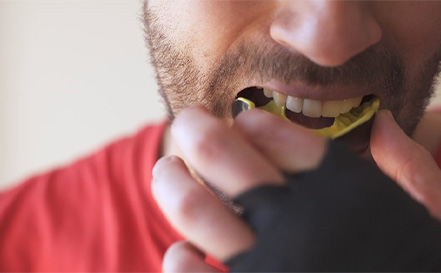
If you participate in sports, then you should have a custom mouthguard for practices and games. This appliance may be small, but it can provide your teeth and gums with just enough protection to help prevent common dental emergencies, like knocked-out teeth.
Note: if you chronically grind or clench your teeth, then a mouthguard may be helpful as well!
Use Tools to Open Packages, Not Your Teeth
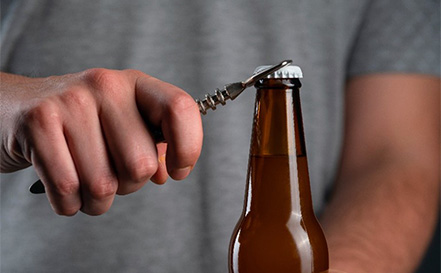
If your teeth are strong and sharp, you may be tempted to use them to open things, like a bag of chips. However, this can introduce unwanted bacteria to your mouth and put immense pressure on your teeth. So, you should always locate the proper tool instead. It may seem inconvenient at the time, but it’s much better than having to drop everything to have a cracked or fractured tooth treated!
Dental Emergency FAQs

How can you make sure that you remain calm enough to make the correct decisions while you’re dealing with an urgent dental problem? One way is to learn as much as you can about dental emergencies and how they’re treated, which makes it easier to feel prepared if something goes wrong. Our patients often ask us various questions about emergency dentistry; here are a few of the most common examples along with some helpful answers. Contact us for assistance if you have a question that isn’t listed here.
Are knocked-out baby teeth a dental emergency?
Baby teeth are different from permanent teeth in that they are supposed to come out. That means if a baby tooth is knocked out of its socket by accident, there’s no need to try and reimplant it. However, that doesn’t mean it’s a non-issue. You need to set up an appointment with us quickly so that we can make sure that there wasn’t any damage to your child’s jaw or their remaining teeth. We may also need to intervene to prevent dental issues like overcrowding.
My chipped tooth doesn’t hurt. Do I still need to visit?
You won’t always feel pain when your tooth has been damaged, and if it has been chipped it’s likely okay to wait a day or two to see a dentist. That said, ignoring it altogether is never an option; you still need a professional to check the tooth to make sure that the inner pulp is safe from infection. Furthermore, having the tooth restored could be essential for stopping further breakage. In short: you should always call us if you have a chipped tooth regardless of whether it hurts or not.
What does chronic bad breath mean?
Plenty of people have bad breath early in the morning or after eating garlic and certain other foods. Bad breath that’s constantly present, on the other hand, is not normal. Oftentimes, it’s a side effect of some manner of dental issue, such as advanced tooth decay.
If bad breath lasts for more than a few days, it could potentially mean something is wrong with your smile. Call our office as soon as you can to schedule a consultation.
Can superglue be used to repair broken dentures?
Trying to fix dentures on your own typically isn’t advisable, and using superglue to do so is an even worse idea. It contains a number of highly toxic chemicals, making it a hazardous substance to put in your mouth. And even if you ignore the health risks, it’s not a very effective solution. Superglue doesn’t have a very long lifespan when it’s kept in a moist environment (which includes a mouth filled with saliva), so any repairs you make are extremely unlikely to last in the long term.
Instead of using superglue on your dentures, call us to see about having them replaced or fixed.
I Need a Checkup & Cleaning I Need a Dentist for My Child I am Concerned About Bleeding Gums I Have a Cavity or Broken Tooth I am Missing One or More Teeth I Want to Enhance My Smile I am Scared of the Dentist I Need My Wisdom Teeth Removed I Have Pain in My Jaw View Our Services
